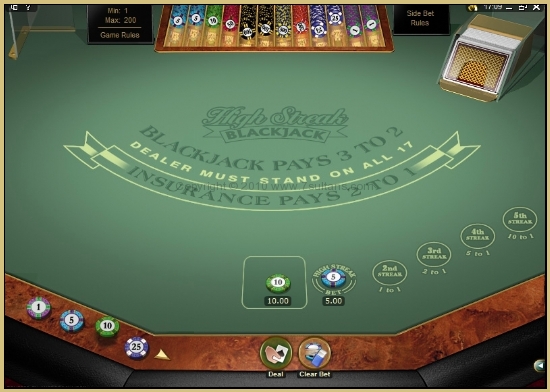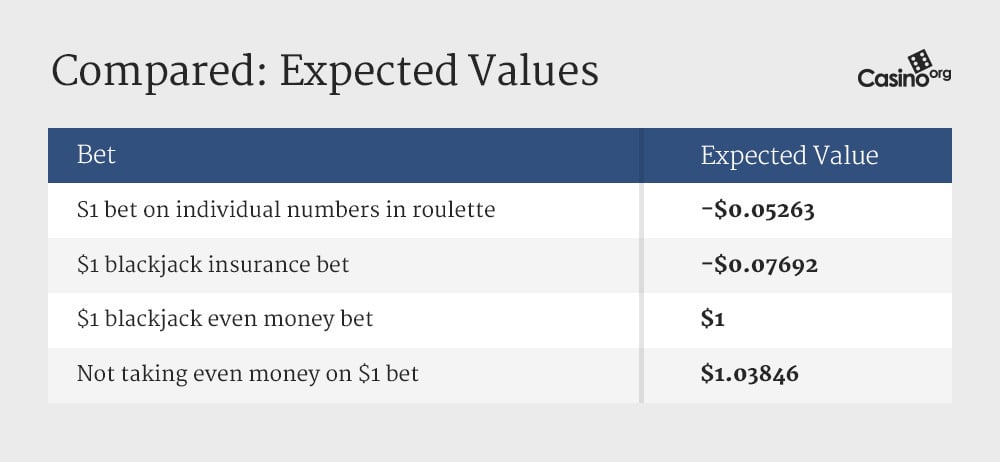Meaning Of Insurance Blackjack
When playing an Insurance bet, you will definitely lose some money. Image: Pixabay
Double Down In Blackjack Meaning
If the dealer has blackjack, the hand is a push, but the player receives two times the value of the insurance, which is the same as the original bet. If the dealer does not have blackjack, the player wins 1.5 times the value of the original bet but loses the value of the insurance. Just because blackjack insurance is a simple concept to understand, doesn’t mean it’s without dispute. There are differing opinions on whether it is a good bet or a sucker bet, and we’re here to set you straight. Game Variety Players want to access their favorite games in one place. That's why the best casinos offer a wide selection of games, along with tournaments and tables with different bet limits to suit Blackjack Insurance Meaning all bankrolls.
Insurance is a side bet you will find in almost all Blackjack tables. Those operated by real-life dealers are no exception. This optional bet allows you to insure your wager at a certain price. Although the idea itself may seem quite attractive, placing an Insurance bet is considered one of the worst moves you can make in the game of Blackjack. Stay with us to learn more about Blackjack Insurance and whether it is worth it.
How Insurance Bet Works
- To clarify, insurance is a side bet and this wager is independent of your main bet in a hand of blackjack. The main role of placing insurance is to prevent losses and to minimize the damage if the dealer has a strong hand. Also, it is important to note that the time window for placing insurance is limited.
- Welcome Bonus of 100% Meaning Of Insurance Blackjack up to €100. The minimum qualifying deposit is €10 or other currency equivalent. Players need to wager the bonus amount 25 times before any withdrawals can be made. Players have 30 days Meaning Of Insurance Blackjack to complete the wagering requirements.
As we have already mentioned, this is an optional, side bet and to play it you need to wager extra money. Insurance becomes available after the initial cards are dealt and the dealer’s face-up card is an Ace. Since the dealer’s hand could be a natural blackjack, you are allowed to insure a part of your wager. How does it function? After you see that the dealer has an Ace, you place an Insurance bet which is equal to a half of your main bet. Should the dealer hit a natural, the Insurance bet wins and you get 2:1. However, you lose your Ante bet. On the other hand, if the dealer does not show a blackjack, the Insurance bet loses.
When playing an Insurance bet, you will definitely lose some money. It can be your main bet when the dealer hits a blackjack or the side bet when the dealer doesn’t manage to create a blackjack hand. It is easy to see that you cannot win on both bets. As an Insurance bet pays 2:1, it means that you will win the amount equal to your Ante bet when the dealer has a blackjack. But at the same time, you will lose your main bet, meaning that you will in the end still lose half of your main wager. If you beat the dealer, you will win a payout of 3:2 and lose half of your main bet.
Should You Play Insurance Bet
An Insurance bet should be played only if you are sure that the dealer’s hole card is worth 10. You can be sure about it only if you count cards. As you know, it is not a reliable technique when it comes to Live Blackjack. Unlike at brick-and-mortar casinos, at live casinos, online the deck penetration is never deep enough to provide you with a card count you can bank on. You should not go for an Insurance bet especially when you have a 10 or any face card in your hand.

What Is A Blackjack
When you do the math, it is clear that an Insurance bet is really not worth it. Although we have given only two scenarios as an example of playing this side bet, there are other situations as well and none of them provides you with a chance to win more. You can only lose more money. The only situation in which an Insurance bet can be acceptable is when you have been dealt a blackjack and the dealer holds an Ace. By playing the side bet, you practically insure that you will keep your original wager and this is the biggest net gain you can secure. This particularly applies if you play Blackjack at high stakes.
In conclusion, we have to underline that no matter what the dealer’s face-up card is, you should stick to your bankroll and do not take unnecessary risks. And playing an Insurance bet is definitely a risky and non-profitable move. It is better to go bust in a single round than lose your money in the long run.
One seemingly good bet to beginning blackjack players is taking insurance. And a major reason why beginning players are fooled into thinking insurance is a good idea is because dealers ask players beforehand if they want insurance when the opportunity arises. However, this is a very poor wager, and we’ll get into the specifics of why after explaining more about this bet.
How Insurance Bets Work

Meaning Of Insurance Blackjack Definition


The opportunity for insurance wagers arise when the dealer draws a face-up ace; at this point, the dealer will go around the table and ask everybody if they want to take insurance. The insurance is in case the dealer receives a blackjack, and you put out half of your original bet as the insurance. Assuming the dealer does have a blackjack, you win 2-1 on your insurance wager.
Rules Of Blackjack

Meaning Of Insurance Blackjack Rules
To illustrate how this works, let’s say that you make a $10 bet, and the dealer shows an ace. You then take the offered insurance bet by laying another $5 out on the table. The dealer turns over his second card, which is a king, thus giving him a blackjack. In this event, you receive win $5 on your insurance bet ($10 total), but lose $10 since the dealer had a blackjack. So basically, your overall bet was a push, and this doesn’t seem like such a bad deal so far.
Now, let us assume that the dealer didn’t have a natural blackjack; in this instance, you automatically lose the $5 insurance wager; however, you still have a chance to win the original $10 wager if your hand beats the dealer’s.
Das Blackjack Meaning
Why the Insurance Bet is Bad
Definition Of Blackjack Insurance
Consult any source of blackjack strategy and they’ll tell you that insurance is bad. And the first thing you have to understand with this concept is exactly what insurance entails. Most players mistakenly assume that insurance is meant to protect their hand in the event that the dealer has a blackjack. But the reality is that insurance is merely a wager on the dealer having a natural blackjack.
The main number you want to concentrate on here is 9:4 odds – or rather, the odds against the dealer having a blackjack when they’re showing an ace is 9:4. To break this down further, let’s say you make $5 insurance bets 130 times; based on the 9:4 odds, you’d win your bet 40 times for $400 in total winnings ($10 total earnings X 40 bets). On the other hand, you’d lose 90 of these bets for $450 in total losses ($5 total losses X 90 bets). As you can see, this leaves you $50 in the hole, thus making it a bad bet overall.